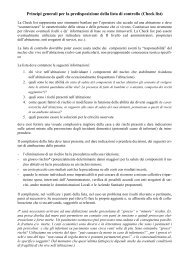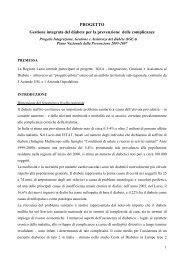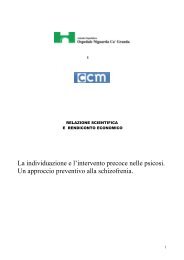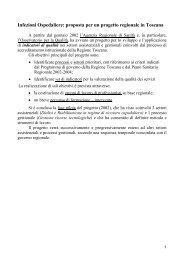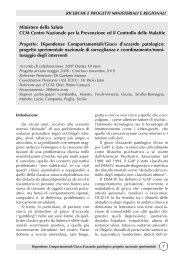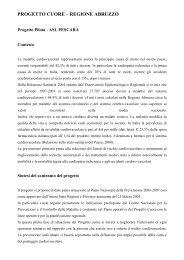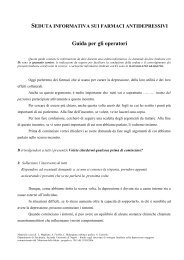Gaining health : analysis of policy development in European ...
Gaining health : analysis of policy development in European ...
Gaining health : analysis of policy development in European ...
Create successful ePaper yourself
Turn your PDF publications into a flip-book with our unique Google optimized e-Paper software.
whether lifestyles can be affected <strong>in</strong> a susta<strong>in</strong>able way without<br />
explicitly tackl<strong>in</strong>g their underly<strong>in</strong>g determ<strong>in</strong>ants. As the<br />
present case studies and relevant WHO reviews <strong>in</strong>dicate:<br />
• there is no clear historical pattern <strong>of</strong> <strong>policy</strong> <strong>development</strong><br />
for tackl<strong>in</strong>g NCD <strong>in</strong> Europe, although certa<strong>in</strong><br />
countries <strong>in</strong>dicate partially similar trends;<br />
• among the eight countries studied, there does not appear<br />
to be a common pattern or package <strong>of</strong> policies<br />
(though this relates partly to the manner <strong>in</strong> which these<br />
countries were selected and their small number); and<br />
• no country has developed a specifically designated<br />
“NCD <strong>policy</strong>” (although Ireland has recently formulated<br />
a framework for the management <strong>of</strong> chronic disease and<br />
Lithuania is prepar<strong>in</strong>g a similar <strong>policy</strong>).<br />
Over a period <strong>of</strong> 2–3 decades <strong>in</strong> F<strong>in</strong>land and Lithuania, and<br />
partly <strong>in</strong> Hungary and Ireland, an <strong>in</strong>itial focus on CVD prevention<br />
was followed by a broaden<strong>in</strong>g <strong>of</strong> the <strong>policy</strong> framework.<br />
This <strong>in</strong>troduced the concept <strong>of</strong> tackl<strong>in</strong>g <strong>in</strong>equalities <strong>in</strong><br />
<strong>health</strong> and their social and economic determ<strong>in</strong>ants through<br />
umbrella policies, <strong>in</strong>fluenced largely by the WHO Health for<br />
All <strong>policy</strong>. These Health-or-All-type policies have been cont<strong>in</strong>ually<br />
revised <strong>in</strong> these countries and issue-specific policies<br />
have been developed simultaneously. More recently, and<br />
partly <strong>in</strong>fluenced by the EU, there has been a stronger focus<br />
on <strong>in</strong>clud<strong>in</strong>g <strong>health</strong> components <strong>in</strong> more general <strong>development</strong><br />
or social <strong>in</strong>clusion plans.<br />
Even these four countries, however, have different “packages”<br />
<strong>of</strong> policies <strong>in</strong> place. From the start, Ireland developed<br />
separate <strong>health</strong> promotion policies to complement the<br />
broad umbrella policies, and is presently mak<strong>in</strong>g a third<br />
revision <strong>of</strong> the <strong>health</strong> promotion <strong>policy</strong>. There are mediumterm<br />
policies for <strong>in</strong>dividual NCD and their risk factors, a<br />
long-term <strong>policy</strong> for cancer (to 2015) and recently a <strong>policy</strong><br />
for the management <strong>of</strong> chronic disease. Parallel to its longterm<br />
umbrella <strong>policy</strong>, F<strong>in</strong>land has medium-term (4–6-year)<br />
plans and strategies for heart <strong>health</strong>, alcohol control and<br />
nutrition, for example, and is currently prepar<strong>in</strong>g a <strong>health</strong><br />
promotion <strong>policy</strong>. Lithuania has a strategy and action plan<br />
for nutrition up to 2010 and is develop<strong>in</strong>g separate policies<br />
for equity <strong>in</strong> <strong>health</strong> and for NCD, but uses “programmes”<br />
to tackle the specific NCD and their risks covered <strong>in</strong> the<br />
umbrella <strong>policy</strong>. In Hungary, after experience with CVD<br />
prevention, four different Health-for-All-type public <strong>health</strong><br />
<strong>policy</strong> frameworks have been elaborated by successive<br />
governments over the last two decades. Topic-based and<br />
largely autonomous policies were later developed, referr<strong>in</strong>g<br />
to the umbrella document and <strong>in</strong>fluenced by <strong>in</strong>ternational<br />
<strong>development</strong>s <strong>in</strong>, for example, tobacco and nutrition.<br />
France <strong>of</strong>fers a special case, whereby a legal <strong>in</strong>strument<br />
serves as the umbrella framework but the driv<strong>in</strong>g force<br />
beh<strong>in</strong>d implementation is based on the various topic-based<br />
policies. Greece has a strategic plan for cancer and a <strong>policy</strong><br />
for mental <strong>health</strong> and is now embark<strong>in</strong>g on a broad public<br />
<strong>health</strong> <strong>policy</strong>. Kyrgyzstan starts with the broadest framework<br />
<strong>policy</strong> document, Manas Taalimi, <strong>of</strong>fer<strong>in</strong>g a strategy<br />
for all the priority areas <strong>of</strong> <strong>health</strong> <strong>policy</strong> and <strong>health</strong> care<br />
<strong>development</strong>. In Albania, the umbrella document at the<br />
moment lacks real political commitment and NCD <strong>policy</strong><br />
<strong>development</strong> is <strong>in</strong>cremental and opportunistic <strong>in</strong> different<br />
programme areas. A national cancer control programme<br />
was developed by the M<strong>in</strong>istry <strong>of</strong> Health dur<strong>in</strong>g 2006/2007<br />
but an action plan for implementation is still awaited<br />
It is apparent, therefore, that one size does not fit all and<br />
that, <strong>in</strong> this small group, there are almost as many “patterns”<br />
or “packages” as there are countries. Some common<br />
traits may be discerned, however.<br />
• All eight countries ratified the WHO FCTC between<br />
October 2004 (France) and May 2006 (Kyrgyzstan) and<br />
at least seven <strong>of</strong> them had a clear tobacco control <strong>policy</strong><br />
and/or legislation <strong>in</strong> place by the time <strong>of</strong> the study.<br />
Chapter 5<br />
217<br />
Reflections on experiences



